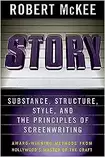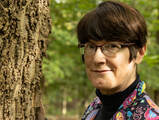| Robert McKee’s how-to book Story is a master class of storytelling genius. Although geared for the Hollywood screenwriter, this award-winning guide contains insights applicable to any writer looking to improve their craft. One impactful tool was focusing each scene on the gap between character expectations and scene outcome, thereby allowing the audience to experience the character’s emotional reaction. |
Other favorite gems:
“For above all else, beyond imagination and skill, what the world asks of you is courage, courage to risk rejection, ridicule, and failure. As you follow your quest for stories told with meaning and beauty, study thoughtfully but write boldly."
- No scene that doesn’t turn…We work around every scene beginning to end by turning a value at stake in a character’s life
- True character is revealed in the choices a human being makes under pressure--the greater the pressure, the deeper the revelation
- Master storytellers never explain. They do the hard, painfully creative thing--they dramatize.
- A story must build to a final action beyond which the audience cannot imagine another.
- All scenes must be thematically or structurally justified in light of the Climax. If they can be cut without disturbing the impact of the ending, they must be cut.
- Convert exposition to ammunition. Let [your characters] use what they know as ammunition to…get what they want.
- Pace the exposition…the least important facts come in early, the next most important later, the critical facts last.
- Melodrama is not the result of overexpression, but of under motivation
“For above all else, beyond imagination and skill, what the world asks of you is courage, courage to risk rejection, ridicule, and failure. As you follow your quest for stories told with meaning and beauty, study thoughtfully but write boldly."
More from Robert McKee: Character


 RSS Feed
RSS Feed